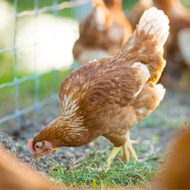Disease control plans ‘must engage backyard farmers’

Just six per cent of keepers were aware of wild bird reserves within 3km of the site where their poultry was kept.
A survey of backyard poultry keepers in Scotland suggests nearly 80 per cent do not consider themselves part of the poultry industry, which could hinder uptake of disease control measures.
Scotland’s Rural College (SRUC) carried out an online survey of nearly 200 ‘backyard’ keepers; defined as those with less than 50 birds. According to the responses, many of these birds never see a veterinary surgeon, or see a vet less than once a year, which could mean diseases are going undetected for long periods of time.
Furthermore, just six per cent of keepers were aware of wild bird reserves within 3km of the site where their poultry was kept. This statistic is particularly troubling as contact with wild birds, especially water fowl, has been linked to outbreaks of avian influenza across the UK.
Over 40 per cent of keepers kept other species alongside their poultry, most commonly horses and sheep, which could also increase the risk of disease transmission. Whilst nearly 80 per cent of respondents had implemented at least one biosecurity measure, the SRUC found that these were not implemented comprehensively in most cases.
SRUC said efforts must be made to engage with backyard keepers on disease control programmes. Useful platforms for this could be social media (e.g. Facebook groups), websites, magazines and vets. The survey revealed common sources of poultry health information were the internet (19 per cent), books and magazines (18 per cent) and vets (19 per cent).
A similar survey of small to medium egg producers (SMEPs) in Scotland revealed over 80 per cent kept other species with poultry, most commonly sheep and cattle. As with backyard farmers, all SMEPs utilised at least one biosecurity measure, but these were not implemented in a comprehensive way.
In addition, nine per cent of workers could have contact with other poultry, mostly at home, which may pose a risk of disease spread between commercial and non-commercial sectors. Sixty-five per cent had one to five beef and sheep farms as neighbours, while 47 per cent had one to five non-commercial poultry keepers as neighbours.
Nearly a quarter of SMEPs (24 per cent) reported that their poultry never saw a vet, while 38 per cent did not consider themselves part of the poultry industry. Most said they were able to house their birds during the 2017 avian influenza prevention zone, with the main husbandry issues being shed cleaning, boredom among birds and aggression/feather pecking. Meanwhile, just 14 per cent were aware of wild bird reserves within 3km of their poultry site.
The survey uncovered a small number of producers using inappropriate methods to kill birds, possibly due to lack of knowledge. While most of those who slaughtered birds on site used cervical dislocation, four reported using pliers or similar, which are unsuitable on welfare grounds. Similarly, a small percentage used methods to dispose of dead or culled birds that are only allowed in remote areas of Scotland, despite not being located in remote areas.
Carla Gomes, who led the project, commented: “These results reinforce just how important it is to promote engagement with backyard and small poultry keepers. Better communication across the industry will increase the uptake of relevant information, such as awareness of disease control programmes, and therefore reduce the risk of diseases being spread.”



 The latest
The latest